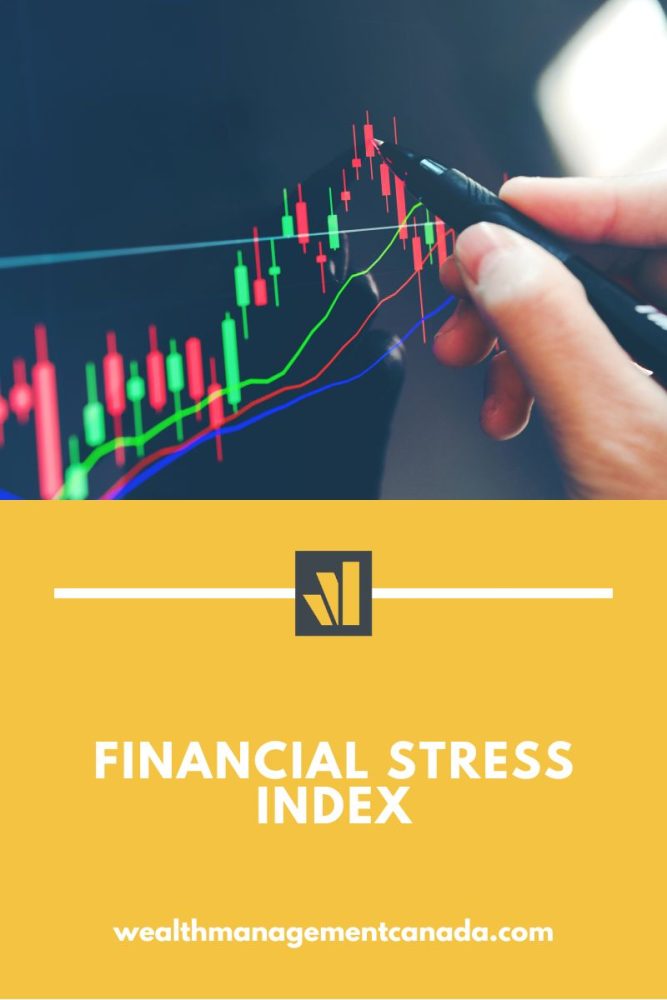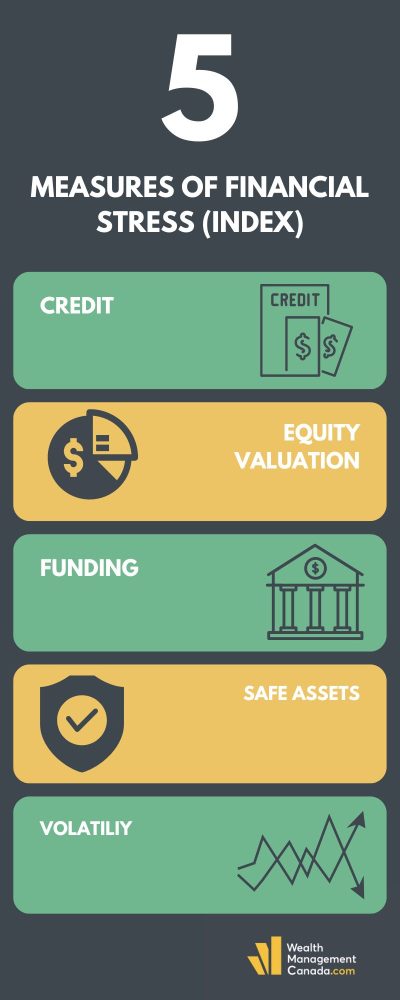The financial stress index is one of many metrics that assesses the health or condition of a market. This particular index is calculated and published by the Office of Financial Research in the United States. It is a daily snapshot of financial stress in global financial markets. The financial stress index can be a helpful tool when making investment or financial decisions. Continue reading to learn more about the financial stress index!

Table of contents
What is the financial stress index?
The financial stress index is calculated and published by the Office of Financial Research, or OFR for short. The index is a daily snapshot based on market data gathered from global financial markets. There are 33 financial market variables that go into the calculation, including valuation measures, interest rates and yield spreads. Furthermore, it incorporates five main categories of indicators: equity valuation, credit, funding, safe assets and volatility.

START WORKING WITH A WEALTH MANAGER NOW
When the financial stress index is positive, it means stress levels are above average. And when the financial stress index is negative, stress levels are below average. The closer the value is to zero, the less stressed the market is, one way or the other. The index primarily focuses on the United States markets. However, since the US impacts many global markets, it’s a useful index to consider no matter where you are in the world. As of August 10, 2023, the financial stress index was -0.778. This indicates financial stress is below average.

What is another word for financial stress?
The definition of financial stress is a condition arising from financial or economic events that create anxiety, real or perceived scarcity, and worry. It is often accompanied with stress responses, may they be physiological, physical or psychological.
For instance, during the 2008 Financial Crisis, many people in the United States and other parts of the world experienced financial stress. Some were homeless after their properties were repossessed. Others were plagued by physical and psychological stressors resulting from being unable to afford their cost of living.
Other words and phrases to describe financial stress include financial hardship, economic crisis, and financial distress. You might also describe financial stress with words like problems, pressures, cash flow issues, decline in economic activity, recession or depression of the economy.
Related Reading: Can Money Buy You Happiness?
How do you measure financial stress?
The financial stress index clearly defines the indicator categories used in their calculations. They are as follows:
- Credit. This measure considers credit spreads which represents the variances in borrowing costs for firms of different levels of creditworthiness. When markets are stressed, credit spreads tend to widen when default risk increases or credit market functioning is disturbed. Wider spreads usually indicate that investors are less willing to take on debt thereby increasing costs for borrowers to get financing.
- Equity valuation. Under this indicator, stock valuations from numerous market indexes are considered. These indexes reflect risk tolerance and investor confidence. When markets are stressed, stock values often fall when investors become less willing to own risky assets.
- Funding. This indicator measures how easily banks and financial institutions can finance their operations. In times of stress, financing markets can slow down or even freeze if participants perceive greater credit or liquidity risk.
- Safe assets. This aspect considers valuation measures of assets that are perceived as having stable value. Usually, this means the asset has stable and predictable cash flows. During times of market stress, higher valuations of safe assets may indicate that investors are migrating away from risky or illiquid assets towards safer investments.
- Volatility. Finally, this indicator considers measures of implied and realized volatility from credit, currency, equity and commodity markets. When markets are stressed, increasing uncertainty about asset values or investor actions can lead to greater volatility.

START WORKING WITH A WEALTH MANAGER NOW
The financial stress index is merely one metric of measuring financial stress. There are other ways to measure how stressed a market is including profitability measures, solvency measures, analyzing interest rates, evaluating inflation, and much more.
Is financial stress a real thing?
Yes, financial stress is absolutely a real thing! Markets are not perfect and they experience highs and lows over periods of time. In fact, many markets are cyclical and experience bull and bear markets. There are many economists who attempt to track, understand and predict such trends, including Benner Cycles.
Why does this happen? There are a million reasons and usually it is a result of a trend that has never been seen before in human history. However, the overarching philosophy and pattern is often the same. In a capitalist market, an asset is exploited until it is no longer usable. When markets become stressed, it’s often because an asset or system has been exploited to exhaustion. The market must go through a reset phase to correct itself, which results in financial stress.
On the individual level, financial stress may make you feel isolated and frustrated. However, these trends affect many people at once, whether you recognize it or not. If you’re feeling the effects mentally or physically, know that you’re not alone and your feelings towards the situation are valid. Also know that financial stress never lasts forever. While you might be going through a tough time now, markets eventually reset themselves and you’ll be back on your feet in no time!
Related Reading: Understanding the Relationship Between Our Economy and the Stock Market
What are the early indicators of financial stress?
There are common signs of financial stress that are witnessed in any market. These include:
- Layoffs. When businesses lose clients as a result of stressed markets, they don’t need to produce as much. In response, they may conduct a round of layoffs.
- Falling asset values. Stock prices, investment valuations and other assets fall in value when markets are stressed.
- Greater market volatility. Prices in markets tend to go up and down more frequently when there’s high financial stress. People in the market are uncertain and that reflects in the market’s volatility.
- Inflation. One of the tell tale signs of financial stress is inflation. When the price of goods and services increases and buyers have less purchasing power, markets are experiencing inflation.
- Rising interest rates. Interest rates communicate a lot about what’s going on in a market. When they rise, it’s usually an attempt of central banks to decrease consumer spending. Debt becomes more expensive, so consumers purchase less, which can depress a market.
- Decreased lending activity. When investors become skeptical in a market, they become less willing to extend financing. This results in less financing being available which naturally increases the cost to borrow through supply and demand. In addition, investors tend to pull out of risky markets and keep their money in safe, reliable markets.
- Personal indicators. On the personal level, an individual experiencing financial stress may struggle to pay their obligations, lose their job, experience negative changes in their lifestyle, and face mental health challenges.

START WORKING WITH A WEALTH MANAGER NOW
Financial Stress Index and You
What does the financial stress index mean for you? When financial stress is high, you may experience the effects on a personal level. And when financial stress is low, you may experience the positive benefits of economic activity. On a greater scale, financial stress in the market can affect your investments and ability to build wealth. However, it all is dependent on your specific circumstances! In fact, many people build their wealth during financially tumultuous times because they capitalize on markets restructuring themselves. While financial stress may feel like a bad thing, sometimes a reset is much needed and can actually help you (and the market) in the long run.
Read More: Fear and Greed Index